新概念英语综合测试题
新概念英语1-48课综合测试卷
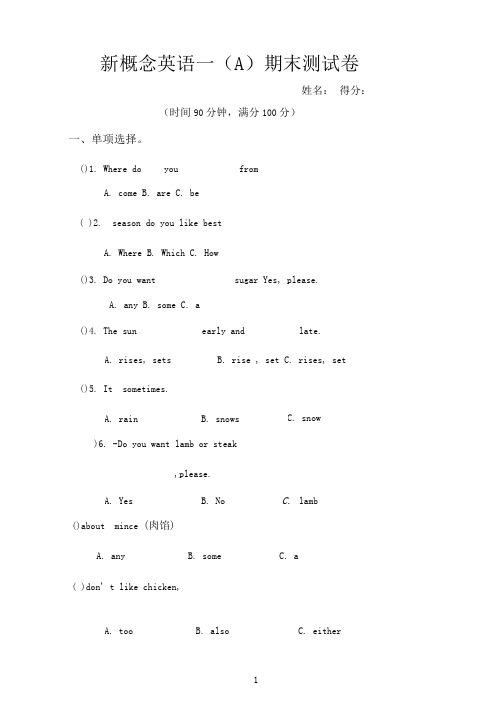
新概念英语一(A)期末测试卷姓名:得分:(时间90分钟,满分100分)一、单项选择。
()1. Where do you fromA. comeB. areC. be( )2. season do you like bestA. WhereB. WhichC. How()3. Do you want sugar Yes, please.A. anyB. someC. a()4. The sun early and late.A. rises, setsB. rise , setC. rises, set()5. It sometimes.A. rainB. snowsC. snow)6. -Do you want lamb or steak,please.A. YesB. Nomb()about mince (肉馅)A. anyB. someC. a( )don' t like chicken,A. tooB. alsoC. either)9. I like chicken, .A. tooB. alsoC. either)10. Can she type this letter meA. inB. forC. at)11. Can you come here minute, pleaseA. aB. anC. the)12. , Sam! The kettle is boiling.A. ComeB. Hurry upC. Ready)13. “在肉店里”的翻译是:A. at butcherB. at the butcher* sC. at butcher* s )14. He is cleaning his .A. teethB. toothC. toothst)15. My mother is the bed.A. makeB. makingC. makeing)16. is a fine day today .A. ThatB. ThisC. It)17. They are looking the sky .A. onB. ofC. at)18. that bag heavyA. AmB. IsC. Are)19. Is there water in the kettleA. anyB. someC. a( )20. There are two on the table.A. knifeB. knivesC. knifes二、将下列词变为现在分词.例do ------- doing1. shave3. wash6.sweep7.type三、将下列名词变成复数形式。
新概念英语第册1-40课综合测试题
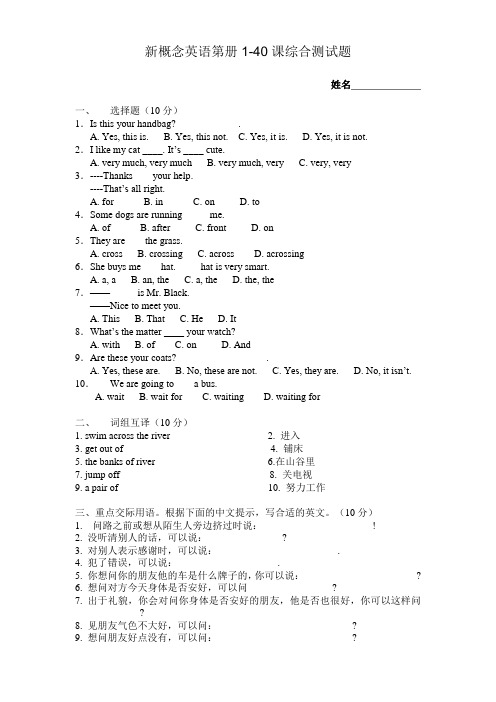
新概念英语第册1-40课综合测试题姓名______________一、选择题(10分)1.Is this your handbag? ____________.A. Yes, this is.B. Yes, this not.C. Yes, it is.D. Yes, it is not.2.I like my cat ____. It’s ____ cute.A. very much, very muchB. very much, veryC. very, very3.----Thanks ___ your help.----That’s all right.A. forB. inC. onD. to4.Some dogs are running _____me.A. ofB. afterC. frontD. on5.They are ___ the grass.A. crossB. crossingC. acrossD. acrossing6.She buys me ___ hat. ____ hat is very smart.A. a, aB. an, theC. a, theD. the, the7.——_____ is Mr. Black.——Nice to meet you.A. ThisB. ThatC. HeD. It8.What’s the matter ____ your watch?A. withB. ofC. onD. And9.Are these your coats? ________________.A. Yes, these are.B. No, these are not.C. Yes, they are.D. No, it isn’t. 10.We are going to ___ a bus.A. waitB. wait forC. waitingD. waiting for二、词组互译(10分)1. swim across the river ________________2. 进入______________3. get out of ________________4. 铺床_______________5. the banks of river __________________6.在山谷里_______________7. jump off________________ 8. 关电视_________________9. a pair of_____________________ 10. 努力工作__________________三、重点交际用语。
新概念1-72综合测试题(已整理)
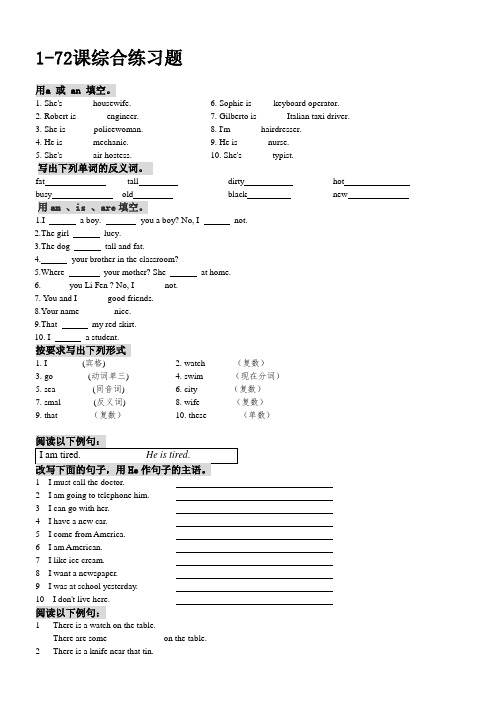
1-72课综合练习题用a 或 an 填空。
1. She's ______ housewife. 6. Sophie is ____ keyboard operator.2. Robert is ______ engineer. 7. Gilberto is ______ Italian taxi driver.3. She is ______policewoman. 8. I'm ______ hairdresser.4. He is ______ mechanic. 9. He is ______ nurse.5. She's ______ air hostess. 10. She's ______ typist.写出下列单词的反义词。
fat tall dirty hot busy old black new 用am 、is 、are填空。
1.I a boy. you a boy? No, I not.2.The girl lucy.3.The dog tall and fat.4. your brother in the classroom?5.Where your mother? She at home.6.______ you Li Fen ? No, I ______ not.7. You and I ______ good friends.8.Your name _______ nice.9.That my red skirt.10. I a student.按要求写出下列形式1. I _______ (宾格)2. watch ______(复数)3. go _______ (动词单三)4. swim ______(现在分词)5. sea________ (同音词)6. city ______ (复数)7. smal_______ (反义词) 8. wife ______ (复数)9. that _______(复数)10. these ______ (单数)阅读以下例句:I am tired. He is tired.改写下面的句子,用He作句子的主语。
新概念英语第一册1—40课综合测试题
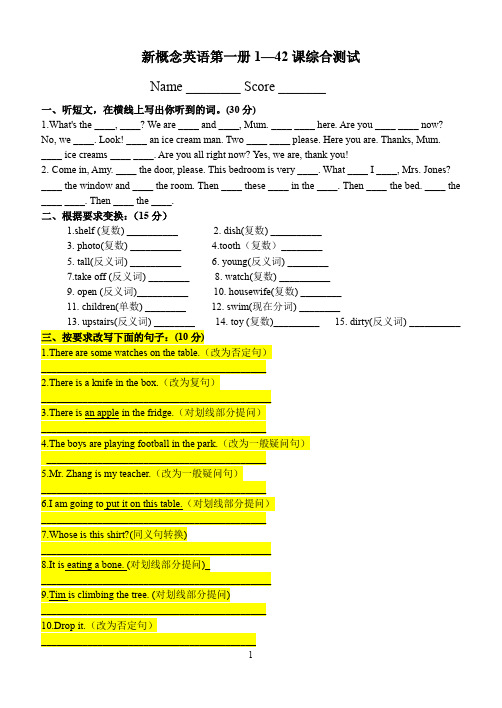
新概念英语第一册1—42课综合测试Name ________ Score _______一、听短文,在横线上写出你听到的词。
(30分)1.What's the ____, ____? We are ____ and ____, Mum. ____ ____ here. Are you ____ ____ now? No, we ____. Look! ____ an ice cream man. Two ____ ____ please. Here you are. Thanks, Mum.____ ice creams ____ ____. Are you all right now? Yes, we are, thank you!e in, Amy. ____ the door, please. This bedroom is very ____. What ____ I ____, Mrs. Jones? ____ the window and ____ the room. Then ____ these ____ in the ____. Then ____ the bed. ____ the ____ ____. Then ____ the ____.二、根据要求变换:(15分)1.shelf (复数) __________2. dish(复数) __________3. photo(复数) __________4.tooth(复数)________5. tall(反义词) __________6. young(反义词) ________7.take off (反义词) ________ 8. watch(复数) __________9. open (反义词)__________ 10. housewife(复数) ________11. children(单数) ________ 12. swim(现在分词) ________13. upstairs(反义词) ________ 14. toy (复数)_________ 15. dirty(反义词) __________三、按要求改写下面的句子:(10分)1.There are some watches on the table.(改为否定句)____________________________________________2.There is a knife in the box.(改为复句)_____________________________________________3.There is an apple in the fridge.(对划线部分提问)____________________________________________4.The boys are playing football in the park.(改为一般疑问句)___________________________________________5.Mr. Zhang is my teacher.(改为一般疑问句)____________________________________________6.I am going to put it on this table.(对划线部分提问)____________________________________________7.Whose is this shirt?(同义句转换)_____________________________________________8.It is eating a bone. (对划线部分提问)______________________________________________9.Tim is climbing the tree. (对划线部分提问)____________________________________________10.Drop it.(改为否定句)__________________________________________四.用方框中所给的词填空。
新概念英语第一册1—16课综合测试题
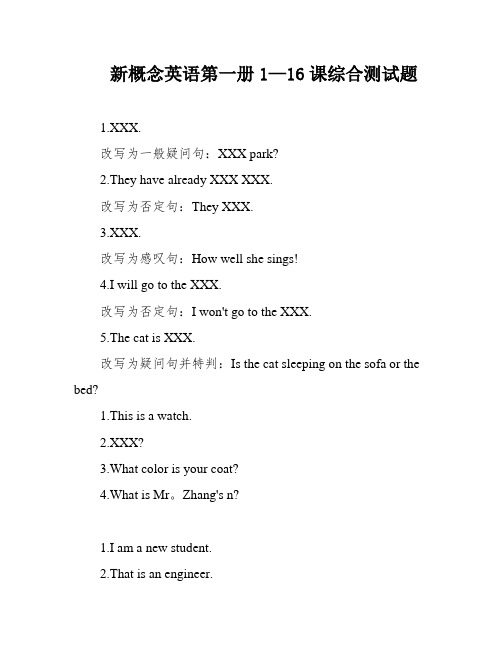
新概念英语第一册1—16课综合测试题1.XXX.改写为一般疑问句:XXX park?2.They have already XXX XXX.改写为否定句:They XXX.3.XXX.改写为感叹句:How well she sings!4.I will go to the XXX.改写为否定句:I won't go to the XXX.5.The cat is XXX.改写为疑问句并特判:Is the cat sleeping on the sofa or the bed?1.This is a watch.2.XXX?3.What color is your coat?4.What is Mr。
Zhang's n?1.I am a new student.2.That is an engineer.3.Are they tourists?4.We are good friends.5.What is your name?1.my。
XXX2.She。
his3.your。
I am4.color1.XXX2.short3.too4.color1.A: It's XXX。
B: It's his.2.A: XXX: XXX。
3.A: I am from China。
B: Nice to meet you.1."Where are my tickets?"2.The speaker is looking for their XXX be.2."What are the children doing?"XXX of some children and is asking for n.3."Can you make the tea。
Sam?"XXX named Sam if they are able to XXX.4."Do you prefer beef or lamb?"XXX.5."Is this your handbag。
新概念英语-2试题及答案
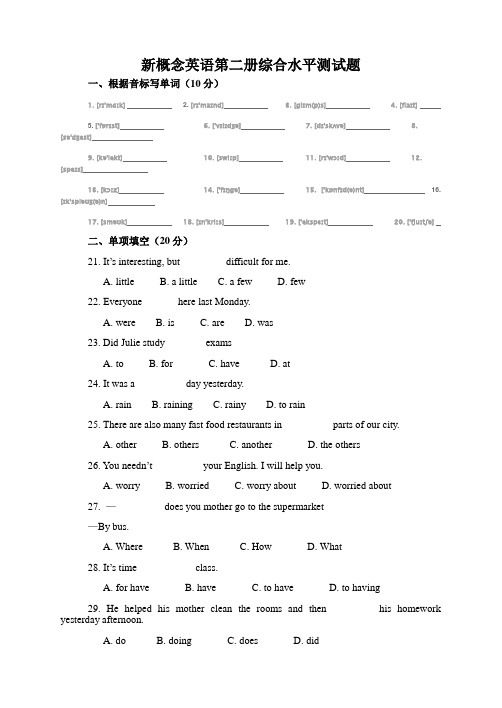
新概念英语第二册综合水平测试题一、根据音标写单词(10分)1. [rɪ'mɑːk]2. [rɪ'maɪnd]3. [glɪm(p)s]4. [flaɪt]5. ['fɒrɪst]6. ['vɪlɪdʒə]7. [dɪ'skʌvə]8.[sə'dʒest]9. [kə'lekt]10. [swiːp]11. [rɪ'wɔːd]12. [speɪs]13. [kɔːz]14. ['fɪŋgə]15. ['kɒnfɪd(ə)nt]16. [ɪk'spləʊʒ(ə)n]17. [sməʊk]18. [ɪn'kriːs]19. ['ekspɜːt]20. ['fjuːtʃə]二、单项填空(20分)21. It’s interesting, but ________ difficult for me.A. littleB. a littleC. a fewD. few22. Everyone ______ here last Monday.A. wereB. isC. areD. was23. Did Julie study _______ examsA. toB. forC. haveD. at24. It was a _________ day yesterday.A. rainB. rainingC. rainyD. to rain25. There are also many fast food restaurants in _________ parts of our city.A. otherB. othersC. anotherD. the others26. You needn’t _________ your English. I will help you.A. worryB. worriedC. worry aboutD. worried about27. —_________ does you mother go to the supermarket—By bus.A. WhereB. WhenC. HowD. What28. It’s time ___________class.A. for haveB. haveC. to haveD. to having29. He helped his mother clean the rooms and then ________ his homework yesterday afternoon.A. doB. doingC. doesD. did30. —Is that ________ interesting book—Yes, but it is ___________ difficult.A. an, a littleB. a, a bitC. a, a littleD. an, little31. —When did you see the film—__________.A. Two hours ago.B. In an hourC. Two hoursD. In two hours ago32. How about _________ the supermarketA. to go toB. goingC. to goD. going to33. I’d like ________ TV, but my father enjoys _________ newspapers.A. watching, readingB. seeing, seeC. to see, seeD. to watch, reading34. His __________ says it’s 7:00 pm.A. beltB. walletC. watchD. ring35. I think the TV show is interesting. Do you ________ meA. likeB. agreeC. agree toD. agree with36. —I love Sports News. What about you—__________.A.I did, tooB.I do, eitherC.I do, tooD. I love to37. —Welcome to Beijing!—__________.A. Not at allB. That’s all rightC. GoodbyeD. Thank you38. Nina’s home is ___________ from here, so she doesn’t have to take the bus.A. five minutes’ walkB. twenty-kilometerC. two hours by busD. two hours39. He is very tired. He doesn’t want to do ___________.A. somethingB. nothingC. everythingD. anything40. I found it _______ to work out this math problem in one minute.A. easyB. easilyC. quicklyD. hardly三、完型填空(10分)阅读下面短文,根据短文内容从每小题A、B、C、D中选出能填入空白处的最佳答案。
新概念英语测试题及答案
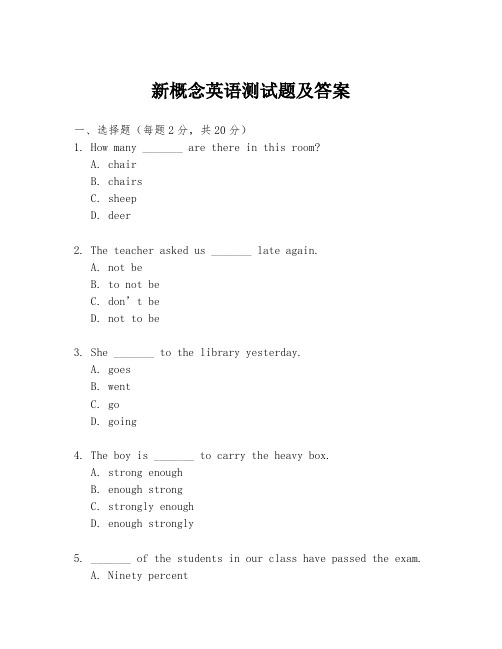
新概念英语测试题及答案一、选择题(每题2分,共20分)1. How many _______ are there in this room?A. chairB. chairsC. sheepD. deer2. The teacher asked us _______ late again.A. not beB. to not beC. don’t beD. not to be3. She _______ to the library yesterday.A. goesB. wentC. goD. going4. The boy is _______ to carry the heavy box.A. strong enoughB. enough strongC. strongly enoughD. enough strongly5. _______ of the students in our class have passed the exam.A. Ninety percentB. Ninety percentsC. The ninety percentD. Ninety percentages二、填空题(每题1分,共10分)6. If you _______ (not hurry), you will miss the bus.7. She _______ (be) a teacher since she graduated from university.8. The children _______ (play) in the park when it started to rain.9. I _______ (not see) you for a long time.10. He _______ (be) to Paris twice.三、阅读理解(每题2分,共20分)Read the following passage and answer the questions. Passage:Last weekend, I went to the countryside with my family. We stayed in a small village and enjoyed the fresh air and beautiful scenery. In the morning, we went for a walk and saw many animals, such as cows, sheep, and horses. In the afternoon, we visited a local farmer and learned about farming life. We also helped him with some farm work.11. Where did the author go last weekend?A. To the cityB. To the countrysideC. To the beachD. To the mountains12. What did the author see during the walk?A. Many buildingsB. Many animalsC. Many peopleD. Many cars13. What did the author do in the afternoon?A. They played games.B. They visited a farmer.C. They went shopping.D. They watched a movie.14. What did the author learn about?A. City lifeB. Farming lifeC. School lifeD. Working life15. What did the author help the farmer with?A. CookingB. Farm workC. CleaningD. Painting四、翻译题(每题5分,共30分)16. 请将以下句子翻译成英文:“他每天早晨都去公园跑步。
(完整版)新概念英语测试卷1-144
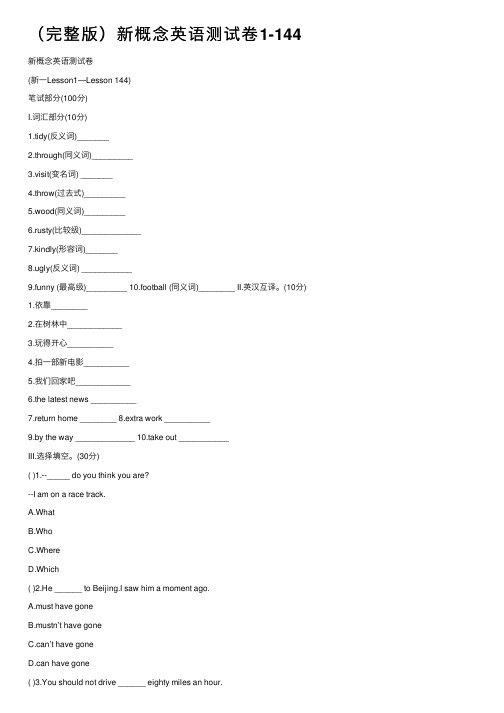
(完整版)新概念英语测试卷1-144新概念英语测试卷(新⼀Lesson1—Lesson 144)笔试部分(100分)I.词汇部分(10分)1.tidy(反义词)_______2.through(同义词)_________3.visit(变名词) _______4.throw(过去式)_________5.wood(同义词)_________6.rusty(⽐较级)_____________7.kindly(形容词)_______8.ugly(反义词) ___________9.funny (最⾼级)_________ 10.football (同义词)________ II.英汉互译。
(10分)1.依靠________2.在树林中____________3.玩得开⼼__________4.拍⼀部新电影__________5.我们回家吧____________6.the latest news __________7.return home ________ 8.extra work __________9.by the way _____________ 10.take out ___________III.选择填空。
(30分)( )1.--_____ do you think you are?--I am on a race track.A.WhatB.WhoC.WhereD.Which( )2.He ______ to Beijing.I saw him a moment ago.A.must have goneB.mustn’t have goneC.can’t have goneD.can have gone( )3.You should not drive ______ eighty miles an hour.A.atB.byC.ofD.on( )4.I was ______ seventy when I was on the highway.A.goingB.doingC.speedingD.starting( )5.You should ______,and it’s good for you.A.take their advicesB.listen to their adviceC.hear their adviceD.take their advice( )6.—Do you know where’s Jack?--I don’t know clearly.He ______ aroad.A.must goB.can goC.may goD.will go( )7.Mary and Jack are going to __________ next week.A.marryB.get marriedC.get marryD.is married( )8.There is the _______ news in the newspaper. /doc/4c7776387.htmlter/doc/4c7776387.htmlte/doc/4c7776387.htmltest/doc/4c7776387.htmlst( )9.If you come to see me,I _____ the money.A.payB.will payC.have payD.pays( )10.This depends ______ your decision.A.onB.inC.ofD.by( )11.My ______ daughter is very lovely.A.four-years-oldB.four year oldC.four-year-oldD.four years-old( )12.You _________ it again,or someone will scold you.A.had not better doB.had better not to doC.not had better to doD.had better not do( )13.She ______ to a children’s party.A.invitesB.was invitedC.invitedD.has invited( )14.She ______ him a month ago.So she knows him.A.has seenB.sawC.will seeD.sees( )15.I found a sign which ______,“No smoking.”A.wroteB.saidC.countsD.speaksIV.句型转换(10分)1.Danny put his photos into small frames.(⽤this time yesterday做时间状语改写句⼦) _____________________________________________________________2.Tom is working in the garden now.(⽤at eight o’clock this morning代替now 改写句⼦)_____________________________________________________________3.“I am very happy to visit your factory,”she said.(变成间接宾语)_____________________________________________________________4.He said that his mother went shopping just now.(变成直接宾语)_____________________________________________________________5.The girl was shopping when the alien got out.(对划线部分提问)__________ was the girl _______ when the alien got out?V.完型填空。
- 1、下载文档前请自行甄别文档内容的完整性,平台不提供额外的编辑、内容补充、找答案等附加服务。
- 2、"仅部分预览"的文档,不可在线预览部分如存在完整性等问题,可反馈申请退款(可完整预览的文档不适用该条件!)。
- 3、如文档侵犯您的权益,请联系客服反馈,我们会尽快为您处理(人工客服工作时间:9:00-18:30)。
新概念英语综合测试题班级:姓名:听力部分1.听音,选出你所听到的单词。
101. ( ) A. wash B. wait C. shave D. sleep2. ( ) A. June B. July C. September D. December3. ( ) A. south B. north C. east D. west4. ( ) A. season B. set C. summer D. snow5. ( ) A. climate B. country C. chicken D. steak6. ( ) A. mince B. meat C. sweet D. butter7. ( ) A. bean B. pear C. pea D. peach8. ( ) A. tomato B. potato C. pleasant D. spring9. ( ) A. Spain B. Sweden C. Holland D. England 10( ) A. beer B. banana C. blackboard D. butter2.为你所听到的单词选择正确的汉语意思。
101. ( ) A. 甜的 B. 新鲜的 C. 上等的 D. 成熟的2. ( ) A. 香蕉 B. 果酱 C. 苹果 D. 果酒3. ( ) A. 饼干 B. 蛋糕 C. 水壶 D. 茶壶4. ( ) A. 举起 B. 喜欢 C. 想 D. 展出5. ( ) A. 后面 B. 找到 C. 沸腾 D. 当然6. ( ) A. 面包 B. 咖啡 C. 肥皂 D. 烟丝7. ( ) A. 前面 B. 后面 C. 左边 D. 右边8. ( ) A. 花瓶 B. 茶壶 C. 盘子 D. 瓷器9. ( ) A. 努力的 B. 工作 C. 书架 D. 锤子10. ( ) A. 建筑物 B. 公园 C. 山谷 D. 村庄3. 为你所听到的问题选择正确的答案。
101. ( ) A. Yes, it is. B. Yes, she is.2. ( ) A. I’m a keyboard operator. B. She’s my teacher.3. ( ) A. I’m fine. B. She’s OK.4. ( ) A. I’m blue. B. It’s blue.5. ( ) A. Yes, I am. B. No, it’s not.6. ( ) A. It’s in the cupboard. B. It’s me.7. ( ) A. I’m sitting under the tree. B. She’s cooking.8. ( ) A. I’m going to put my hat on. B. I go to Beijing buy car.9. ( ) A. Yes, there is. B. No, there aren’t.10. ( ) A. She comes from Brazil. B. I come from Greece.4. 听音排序,用数字标号。
10( ) We are Norwegian, we come from Norway.( ) She’s Spanish. She comes from Spain.( ) I can make cakes, but I can’t make biscuits.( ) I can lift the chair, but I can’t lift the table.( ) I’m going to wait for a bus.( ) Now I’m wait ing for a bus.( ) The boy is putting on his shirt.( ) The girl is turning off the tap.( ) They are near that box.( ) They are in that handbag.笔试部分1.单项选择:20( )1. Where do you__________ from?A. comeB. areC. be( )2. __________ season do you like best?A. WhereB. WhichC. How( )3. What’s the climate like?的同义句是:A. What’s the weather like?B. How’s the weather like?( )4. Do you want _________ sugar? Yes, please.A. anyB. someC. a( )5. The sun ______ early and _______ late.A. rises, setsB. rise , setC. rises, set( )6. It __________ sometimes.A. rainB. snowsC. snow( )7. A: Do you want lamb or steak? B: __________, please.A. YesB. NoC. lamb( )8.What about ____________ mince(肉馅)?A. anyB. someC. a( )9. I don’t like chicken, _____________.A. tooB. alsoC. either( )10. I like chicken, ___________.A. tooB. alsoC. either( )11. The days are long and the nights are short. 的翻译是:A.昼长夜短B. 昼短夜长( )12. The days are short and the nights are long. 的翻译是:A.昼长夜短B. 昼短夜长( )13. Can she type this letter _________ me?A. inB. forC. at( )14. Can you come here _______ minute, please?A. aB. anC. the( )15. ____________, Sam! The kettle is boiling.A. ComeB. Hurry upC. Ready( )16. “在肉店里”的翻译是:A. at butcherB. at the butcher’sC. at butcher’s( )17. He is cleaning his __________.A. teethB. toothC. teet( )18. My mother is __________ the bed.A. makeB. makingC. makeing( )19. “飞机在桥上飞过。
”的翻译是:A. The aeroplane is flying over the bridge.B. The aeroplane is flying on the bridge.C. The aeroplane is flying under the bridge.( )20. In China, what’s the weather like in summer?A. warmB. hotC. cold2. 将下列词变为现在分词.例do ______ doing 51. shave2. cry3. wash4. jump5. swim6. sweep7. type 8. climb9. shut 10. run3. 将下列名词变成复数形式。
注意:有不用变化的不可数名词。
101. box2. watch3. knife4. leaf5. potato6. tomato7. orange 8. bus9. family 10. boy11. season 12. peach13. banana 14. cake15. minute 16. tea17. bird 18. chocolate19. sugar 20. cheese4. 为下列单词选择正确的汉语意思。
填字母序号即可101. mild2. interesting3. season4. always5. subject6. England7. snow 8. weather 9. sometimes10. spring 11. country 12. rain13. windy 14. pear 15. fresh16. chicken 17. beef 18. blackboard19. sweet 20. like选项:A. 梨B. 国家C. 有趣的D. 温和的,温暖的E. 牛肉F. 黑板G. 春天H. 天气I. 新鲜的J. 雪K. 一直,总是L. 有时M. 鸡肉N. 甜的O. 喜欢P. 英格兰Q. 科目,话题R. 季节S. 雨,下雨T. 刮风的5. 选词填空: 5off for under between behind1. The ship is going ___________ the bridge.2. The girl is sitting ___________ her mother and father.3. The blackboard is ___________ the teacher.4. The boy is jump _________ the branch.5. Can you type the letter _________ me?6. 阅读理解:10(一)Hello, my name is John. I have P.E , art and English on Tuesday星期二. It’s my favorite day. I like English. Look, that is my math tea cher. He’s very kind和蔼. His name is Li Hai. I like beef very much, butI don’t like apples. I like bananas, too.判断对错,用T表示正确,F表示错误。
(5分)()1. John has P.E and computer on Tuesday.()2. John’s favorite day is Monday.()3. Mr Li is John’s English teach er.()4. John likes apple very much.()5. John’s math teacher is short and kind.How old are you ?Mingming is going to England. He wants to know something about English people. One day he sees an English girl in the street . Then he comes up to her.“Excuse me, may I ask you some questions(问题)?”“Of course, you may.” answers the girl.“I’m going to go to London. What should I notice(注意) When I was talking with English peoplein London?” asks Mingming.“Well, don’t ask a woman how old she is and…”“But how old are you ?” Mingming stops the girl and asks suddenly突然的.“I…”The girl gets angry(生气的).“Why do you get angry?” asks Mingming. “Now we are in China, not in England , you see.”在A B C中选出一最佳答案。
